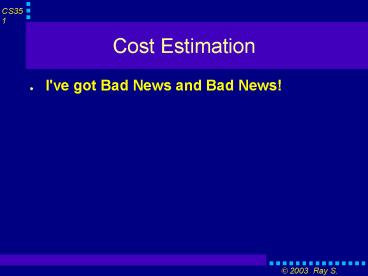Cost Estimation - PowerPoint PPT Presentation
Title:
Cost Estimation
Description:
Environment changes (Windows NT - Windows XP) Additional functionality is requested. ... Two people cannot produce code twice as fast as one person. ... – PowerPoint PPT presentation
Number of Views:22
Avg rating:3.0/5.0
Title: Cost Estimation
1
Cost Estimation
- I've got Bad News and Bad News!
2
Cost Estimation
- I've got Bad News and Bad News!
- Accurate estimation of the cost to develop
software projects is NEARLY IMPOSSIBLE.
3
Cost Estimation
- I've got Bad News and Bad News!
- Accurate estimation of the cost to develop
software projects is NEARLY IMPOSSIBLE. - NEARLY EVERY project manager expects you to come
up with an accurate estimate of cost.
4
Some Observations
- The only time you can be 100 accurate in the
cost of the project is after the project is
completely finished.
5
Some Observations
- The only time you can be 100 accurate in the
cost of the project is after the project is
completely finished. - Most software projects are never completely
finished.
6
Some Observations
- The only time you can be 100 accurate in the
cost of the project is after the project is
completely finished. - Most software projects are never completely
finished. - Experience helps.
7
Cont.
- If computer efficiency has increased multiple
orders of magnitude, and size of memory has
increased multiple orders of magnitude and disk
space has increased multiple orders of magnitude
and the object oriented paradigm has permitted
software reuse, - WHY HASN'T THE COST OF DEVELOPING SOFTWARE
DRAMATICALLY BEEN REDUCDE??
8
Some Answers
- Software complexity has increased by many orders
of magnitude. - Salaries continue to increase and most of the
cost to develop software is people oriented.
9
Observations
- A majority of the cost to develop software is the
human effort involved. - So, cost estimation is really effort estimation.
- It appears intuitive that the effort is
proportional to the complexity of the project.
10
Cont.
- Complexity is relative. It's not always related
just to size. - A small project that is done by new software
engineers unfamiliar with the company or the
project is complex. - A large project that is done by experienced
software engineers familiar with previous (almost
identical) projects is not as complex.
11
So what to do???
- Begin day one to establish a history of your
development effort at your company. - Keep records of the unexpected cost factors that
come up. - Customer changes their mind about a functional
requirement. - Environment changes (Windows NT -gt Windows XP)
- Additional functionality is requested.
- Plan to become an expert in estimating your
effort in software development.
12
Causes of Inaccurate Estimates
- Frequent requests for changes by users.
- Overlooked tasks
- User's lack of understanding of their own
requirements. - Insufficient analysis when developing an estimate
(pressure to get it done NOW!). - Lack of coordination of systems development,
technical services, operations, data
administration, and other functions during
development. - Lack of an adequate method or guidelines for
estimating.
13
Aspects of the projectthat are key estimate
influences
- Complexity of the proposed application system.
- Required integration with existing system.
- Complexity of the programs in the system.
- Size of the system expressed as number of
functions or programs. - Capabilities of the project team members.
- Project team's experience with the application.
14
Cont.
- Anticipated frequency or extent of potential
changes in user requirements. - Project team's experience with the programming
language or hardware. - Database management system.
- Number of project team members.
- Extent of programming or documentation standards.
- Availability or tools such as application
generators. (Familiarity of the team)
15
Accuracy of Estimates
- (Show overhead slide from Boehm.)
16
Estimation Techniques
- Expert Judgement.
- Algorithmic Methods.
- Machine-Learning Methods.
17
Expert Judgement
- The accuracy of the prediction is based on the
competence, experience, objectivity, and
perception of the estimator. - An educated guess
- Based on a top-down or bottom-up analysis of
what is needed. - Analogies are used to estimate effort.
18
Cont.
- The analogy process can be formalized by asking
several experts to make three predictions - A pessimistic one (x).
- A most likely guess (y).
- An optimistic one (z).
- Then these are combined as the mean of the beta
probability distribution. - ( x 4y z ) / 6
19
Delphi
- Experts are asked to make individual predictions
secretly, based on their expertise and using
whatever process they choose. - Then the average estimate is calculated and
presented to the group. - Each expert has the opportunity to revise his or
her estimate, if desired. - The process is repeated until no expert wants to
revise.
20
Delphi cont.
- Sometimes a discussion is allowed before the
revised estimates are calculated. - Another variation is to allow the extreme
estimators to make a case for their decisions
anonymously.
21
Wolverton Model Cost Matrix
22
Other conflicts
- Adding people to a late project simply makes it
later. - Two people cannot produce code twice as fast as
one person. - A model that may work for one organization may
not apply to another. - Most expert judgement techniques are simplistic,
neglecting a large number of factors
So.......
23
Algorithmic Methods
- Empirical models to express the relationship
between effort and the factors that influence it. - Models are usually described using equations
- E (a bS ) m(X)
- S estimated size of the system
- a,b,c constants
- X is a vector of cost factors, m is an adjustment
multiplier based on X
Ac
24
One of the firstby Walston and Felix
- 0.91
- E 5.25 S
- For 60 projects ranging in size from 4000 to
467,000 lines of code, written in 28 different
high-level languages on 66 computers and
representing from 12 to 11,758 person-months of
effort.































